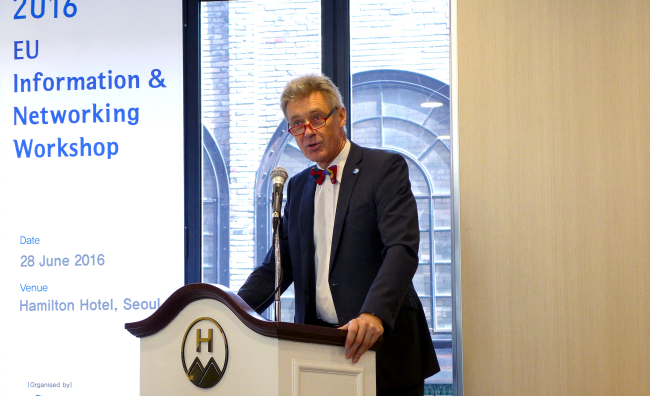‘Partnering Europe boon for science and innovation’
By Korea HeraldPublished : July 3, 2016 - 19:52
The European Union delegation on Tuesday organized a workshop to raise the profile of European research institutions here and foster future collaboration with Korean partners in science, technology and innovation.
The venue at the Hamilton Hotel in Seoul was co-organized by the delegation, the National Research Foundation of Korea and government-funded research agencies in Korea.
As Europe leaps forward and engages the world in science and innovation, harnessing links and carrying out joint projects with Asia’s leading technological hubs has become increasingly important, according to European Union Ambassador Gerhard Sabathil.
The venue at the Hamilton Hotel in Seoul was co-organized by the delegation, the National Research Foundation of Korea and government-funded research agencies in Korea.
As Europe leaps forward and engages the world in science and innovation, harnessing links and carrying out joint projects with Asia’s leading technological hubs has become increasingly important, according to European Union Ambassador Gerhard Sabathil.

“Korea and Europe have a long history of peaceful and constructive relations, and since 2006, our cooperation in science and technology has been continuously strengthened and diversified,” he said in a speech.
“In particular, Korea is strong in commercializing its science and technology achievements, while Europe, despite being the world’s leading research powerhouse, has not always succeeded in pushing research discoveries onto the market.”
Stressing research and innovation vitalize investment, better products and services, competition and employment, the ambassador pointed out that the EU’s investment plan has extensively supported innovation-related projects and enterprises through the European Fund for Strategic Investment.
The EU has upped its financial commitment to research and innovation funding through the Horizon 2020 program, the largest ever of its kind with 77 billion euros ($85.8 billion) invested between 2014 and 2020.
In line with these objectives, the EU has three goals: “open innovation,” “open science” and “open to the world.”
According to Paolo Caridi, the EU’s head of trade section, the open innovation policy aims to harmonize government, academia, business, finance and civic agencies for synergy. It has reformed regulations, revised policies and boosted private investment.
The open science policy strives to open up and liberalize the research process, encompassing conceptualization, data-gathering, analysis, publication and review. Making scientific research more efficient, inclusive and citizen-oriented is its leitmotif.
The open to the world policy recognizes that science is a worldwide collaborative endeavor, according to the delegation. As global value chains and knowledge flows become increasingly far-flung and embedded, international collaboration geared toward innovation becomes essential, Caridi noted.
Areas of deepening cooperation are information and communications technology, particularly the 5th Generation networks, the Internet of Things and mobile cloud services; technologies for renewable energies, especially those geared to capturing carbon dioxide; nanotechnology; health and remedies for infectious diseases; and institutional harmonization and streamlining.
Possibilities for future collaboration lie in nanoelectronics, smart grids, materials modeling, innovative medicine and medical devices and satellite navigation, he added.
“Stronger cooperation between Europe and Korea will help both sides derive outstanding results, and furthermore, solve global challenges,” Sabathil underlined. “The world now needs communication and cooperation to steer out of crises, and research and innovation will spur mutual growth and economic recovery.”
By Joel Lee (joel@heraldcorp.com)
-
Articles by Korea Herald









![[Hello India] Hyundai Motor vows to boost 'clean mobility' in India](http://res.heraldm.com/phpwas/restmb_idxmake.php?idx=644&simg=/content/image/2024/04/25/20240425050672_0.jpg&u=)









